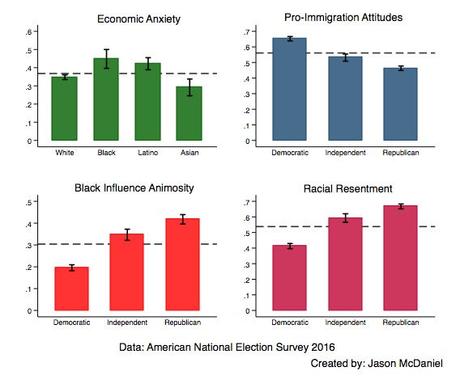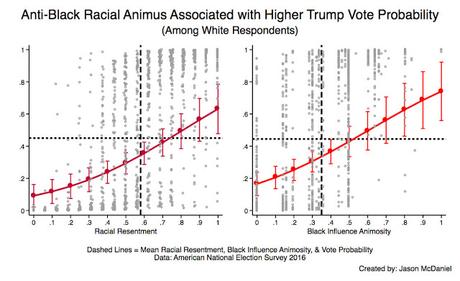
The Nation has an excellent article, written by Sean McElwee and Jason McDaniel, on what propelled Donald Trump to his win in the 2016 election. The most common reason given by most political pundits is that it was economics -- because Trump promised jobs. That was wrong. The article concerns a new study that exposes a very troubling thing about the election.
Instead of economics, the biggest thing that drew white voters to support Trump was his racist and anti-immigrant stances. The study further states that this has resulted in a realignment of the two political parties -- with anti-racist and anti-bigotry people moving to the Democratic Party, and racist and bigoted individuals moving to the Republican Party. That defines each party much more than economic policy.
There are those who believe that this nation has nearly solved it's problem with racism. That is far from the truth. If a presidential candidate can win enough votes to tip the scales of the Electoral College, then racism is still a big problem in this country (and the same could be said of other forms of bigotry).
I post just a small part of the article below, but I encourage you to read the whole article. It would be worth your time. McElwee and McDaniel write:
Was Donald Trump elected because of racism or economic anxiety? Few questions about the 2016 election have generated more analysis. As we’ve previously written, it is clear racism propelled Trumpto the Republican nomination. But how did the racial resentment that powered Trump’s ascent differ from the support for Republican candidates in prior elections? And what was the relative importance of economic peril to voting in 2016 compared to several different types of racism and racial animus exhibited by voters? The answers can be found in the comprehensive American National Election Studies pre- and post-election survey of over 4,000 respondents, which we analyzed to explore the impact of racism and economic peril on 2016 voting behavior. The results are clear, and move a long way towards settling this debate. Our analysis shows Trump accelerated a realignment in the electorate around racism, across several different measures of racial animus—and that it helped him win. By contrast, we found little evidence to suggest individual economic distress benefited Trump. The American political system is sorting so that racial progressivism and economic progressivism are aligned in the Democratic Party and racial conservatism and economic conservatism are aligned in the Republican Party. . . . In our models, racial attitudes towards blacks and immigration are the key factors associated with support for Trump. The way that these variables impact Trump support can be seen in the charts below. Both racial resentment and black influence animosity are significant predictors of Trump support among white respondents, independent of partisanship, ideology, education levels, and the other factors included in the model. . . .

The effect of immigration attitudes for white people is even stronger than anti-black attitudes. . . . Our results also indicate that economic peril was not a significant predictor of voting for Trump once either racial attitudes or immigration attitudes are included in the models. As shown in the chart below, Trump vote probability for an average white person does not change regardless of whether they express high or low levels of economic insecurity. This result is markedly different in comparison to the 2012 election, when higher levels of economic anxiety was associated with lower levels of support for Mitt Romney among the average white person. . . . It’s likely that political elites (party leaders, activists, media organizations) will continue on the current path and the issue of identity will fully map onto the current political divides. Economic conservatism and white nationalism will become more fully intertwined for Republicans, as will racial and economic equity for Democrats. Republicans have shown little interest in attempting to hold back Trump’s openly racist rhetoric. On the other side, few Democrats have proposed abandoning civil rights (and those who have metintense backlash). Democrats may press forward with an economic, racial and gender progressive agenda, while Republicans continue to tie economic conservatism to white identity politics.

